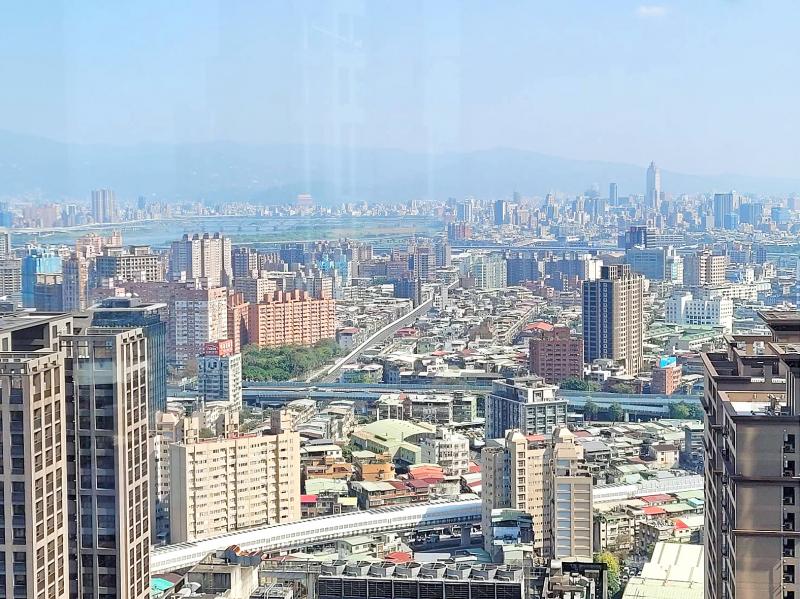New Taipei City has seen an rise in its house purchases this year, as more people are willing to take residence in second-tier locations given the high cost of purchasing a house in the capital and other major locations, Shining Building Business Co (鄉林建設) said yesterday.
As of last month, the number of households in New Taipei City rose by 10,382 from December last year, with the districts of Sinjhuang (新莊), Tamsui (淡水), Banciao (板橋), Linkou (林口) and Tucheng (土城) seeing the largest increases, the company said, citing government data.
Taoyuan and Taichung also reported growth in household numbers during the same period, while Taipei, Tainan and Kaohsiung posted declines, the Taichung-based developer said.

Photo: Lai Hsiao-tung, Taipei Times
Improvements in infrastructure and the relative affordability of homes accounted for the changes, it added.
Housing prices in Taipei are approximately 15.54 times the median annual household income, compared with 12.25 times in New Taipei City, the company said, citing first-quarter statistics from the Ministry of the Interior.
Relative housing affordability and the expansion of MRT lines have made New Taipei City a popular choice for residence, the developer said.
Additionally, major shopping malls, department stores and movie theaters have expanded their presence in second-tier locations to take advantage of their newfound population growth, it said.
Taipei’s population shrank by 44,000 people last year, while losing another 19,000 in the first eight months of this year, posing a threat to consumer activity in the long term, the company said.
Given the growth trend, rezoned areas in New Taipei City are in need of new elementary and junior high schools to accommodate new students, it said.
A rezoned area in Sinjhuang District might soon evolve into a first-tier battleground as it has attracted property investments from major developers such as Huaku Development Co (華固建設), Ruentex Development Co (潤泰新), Pau Jar Group (寶佳機構), Hiyes International Co (海悅) and Shining Building.
Shining Building sold out a presale project in Sinjhuang in the first six months after its launch three years ago. Construction of the project is due for completion by the end of this year.
Housing transactions in Sinjhuang are on the rise because it is home to several government ministries and agencies, as well as being within a convenient distance of the Taiwan Taoyuan International Airport MRT line, the company said.

MULTIFACETED: A task force has analyzed possible scenarios and created responses to assist domestic industries in dealing with US tariffs, the economics minister said The Executive Yuan is tomorrow to announce countermeasures to US President Donald Trump’s planned reciprocal tariffs, although the details of the plan would not be made public until Monday next week, Minister of Economic Affairs J.W. Kuo (郭智輝) said yesterday. The Cabinet established an economic and trade task force in November last year to deal with US trade and tariff related issues, Kuo told reporters outside the legislature in Taipei. The task force has been analyzing and evaluating all kinds of scenarios to identify suitable responses and determine how best to assist domestic industries in managing the effects of Trump’s tariffs, he

TIGHT-LIPPED: UMC said it had no merger plans at the moment, after Nikkei Asia reported that the firm and GlobalFoundries were considering restarting merger talks United Microelectronics Corp (UMC, 聯電), the world’s No. 4 contract chipmaker, yesterday launched a new US$5 billion 12-inch chip factory in Singapore as part of its latest effort to diversify its manufacturing footprint amid growing geopolitical risks. The new factory, adjacent to UMC’s existing Singapore fab in the Pasir Res Wafer Fab Park, is scheduled to enter volume production next year, utilizing mature 22-nanometer and 28-nanometer process technologies, UMC said in a statement. The company plans to invest US$5 billion during the first phase of the new fab, which would have an installed capacity of 30,000 12-inch wafers per month, it said. The

Taiwan’s official purchasing managers’ index (PMI) last month rose 0.2 percentage points to 54.2, in a second consecutive month of expansion, thanks to front-loading demand intended to avoid potential US tariff hikes, the Chung-Hua Institution for Economic Research (CIER, 中華經濟研究院) said yesterday. While short-term demand appeared robust, uncertainties rose due to US President Donald Trump’s unpredictable trade policy, CIER president Lien Hsien-ming (連賢明) told a news conference in Taipei. Taiwan’s economy this year would be characterized by high-level fluctuations and the volatility would be wilder than most expect, Lien said Demand for electronics, particularly semiconductors, continues to benefit from US technology giants’ effort

‘SWASTICAR’: Tesla CEO Elon Musk’s close association with Donald Trump has prompted opponents to brand him a ‘Nazi’ and resulted in a dramatic drop in sales Demonstrators descended on Tesla Inc dealerships across the US, and in Europe and Canada on Saturday to protest company chief Elon Musk, who has amassed extraordinary power as a top adviser to US President Donald Trump. Waving signs with messages such as “Musk is stealing our money” and “Reclaim our country,” the protests largely took place peacefully following fiery episodes of vandalism on Tesla vehicles, dealerships and other facilities in recent weeks that US officials have denounced as terrorism. Hundreds rallied on Saturday outside the Tesla dealership in Manhattan. Some blasted Musk, the world’s richest man, while others demanded the shuttering of his